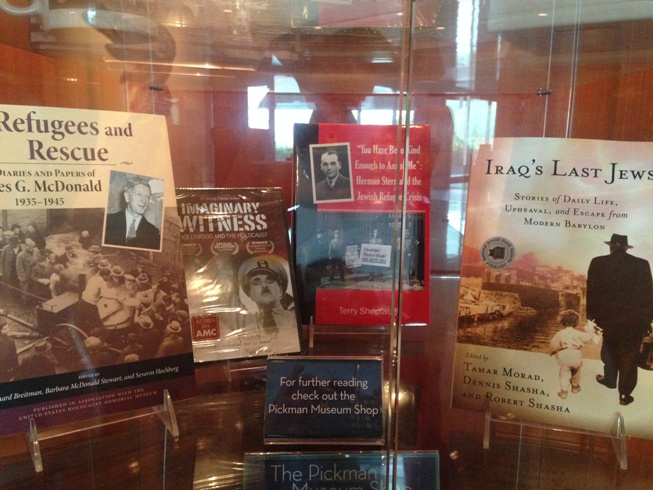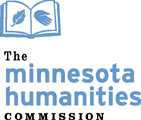Recognition for Herman Stern
The efforts of Herman Stern to save his family and so many others remained unknown for years. Stern was a private man who was, his son recalled, "the first to step up to help and the last person to want any credit." Stern said nothing about his sponsorship of over a hundred refugees, asked everyone to say nothing and simply follow his example to help when help was needed. "They don't owe me anything," his told his sons.
But over time, as, in the years that followed,
Stern went on to be recognized for his other activities -- in developing the
Greater North Dakota Association, the state's Winter Show, the promotion of
scouting, and many other public improvement efforts -- the story of his aid
to refugees came out. By the 1960s, the North Dakota press had
published short stories about how he, with the help of Gerald Nye, had
helped so many escape the Holocaust. Stern himself said little about
it, commenting in a short, taped interview in the 1970s that "my wife,
Adeline, and I decided we couldn't sit by and do nothing." He felt it was
“just an accident that I came to this country” and he and his wife had the
“responsibility to make it possible for other people to continue to live and
have an opportunity to enjoy this great country of ours, which was so good
to us.”
After Herman Stern's death in 1980, his son Edward gave his business papers to the University of North Dakota. It was there that the copies of Stern's letters to the U.S. State Department, and his affidavits sponsoring the refugees, were found. A short article on what Stern had done, entitled "The Angel of the Prairie," was published soon after, but received little notice. It was not until the 1990s, during the commemorations of World War II, that Stern's story received more attention.

 |
| Several items from the Herman Stern papers were featured in an exhibit , "Against the Odds," at New York City's Museum of Jewish Heritage. These items included photographs, letters, and testimony from those Stern sponsored, |
In March 2014, Herman Stern was named by North
Dakota Governor Jack Dalrymple to the the Theodore Roosevelt Rough Rider
Hall of Fame, established in 1961 to recognize present and former North
Dakotans who have been influenced by the state in achieving national
recognition in their fields of endeavor.
Michael
Exhibit credits and acknowledgments: 
This exhibit was designed at the Northwest Minnesota Historical Center, on the campus of Minnesota State University Moorhead. Special thanks to Korella Selzler of the Center for her assistance in the development of the site.
The Center gratefully acknowledges the help of the Minnesota Humanities Commission for its generous grant assistance for obtaining oral interviews and documents used in the exhibit. Supplemental assistance from the MSUM Alumni Foundation and the Roland and Beth Dille for Excellence is also appreciated.
Also a big thank you to Edward and Richard Stern, the sons of Herman Stern, without whose generous assistance this project could not have been done.
Thanks also to the Elwyn B. Robinson Department of Special Collections, Chester Fritz Library, University of North Dakota, for permission to reproduce letters from the Herman Stern Papers.
The Center also wishes to thank Jody Bendel for the production of the Stern family genealogy graphic, Robert Schieffer for production of the sound files, and Gisela Nobel, professor emerita of MSUM for translations of some of the letters in the Herman Stern papers. Thanks are also due to Dr. John Neumaier, president emeritus of Moorhead State for his assistance.
TO LEARN MORE ABOUT THE SUBJECTS OF JEWISH REFUGEES AND THE HOLOCAUST:
Links to other web sites:
United States Holocaust Memorial Museum (the USHMM has one of the most comprehensive websites on the Holocaust, with excellent essays, displays, and links to many other sites)
The Avalon Project (transcripts and copies of major historical and legal documents, including the Nuremberg War Crimes Trials)
Center for Holocaust and Genocide Studies, University of Minnesota (contains a great deal of information on the Holocaust and links to hundreds of related sites)
German Propaganda Archive -- Nazi Propaganda (site maintained by Calvin College, with transcripts of many anti-Semitic publications and speeches between 1933 and 1945)
The Holocaust Chronicle (site organized in book-like fashion, providing a year-by-year account of the Holocaust)
The Nizkor Project (includes transcripts of the trial of Adolf Eichmann, Holocaust research guides, information on the concentration camps, and information on the Holocaust denial movement)
Yad Vashem, Shoah Resource Center (extensive web site maintained by the Yad Vashem museum and research center in Jerusalem)
Principal Publications:
Gotz Aly, 'Final Solution': Nazi Population Policy
and the Murder of the European Jews (1999)
Mark Anderson, editor, Hitler's Exiles: Personal; Stories of the Flight
from Nazi Germany to America (1998)
Yitzhak Arad, et. al., editors, Documents on the Holocaust (1999)
Richard Breitman, Official Secrets: What the Nazis Planned, What the
British and Americans Knew (1998)
Martin Broszat, The Hitler State: The Foundation and Development of the
Internal Structure of the Third Reich (1981)
Stephen Budiansky, Battle of Wits: The Complete Story of Code-Breaking
During World War II (2000)
Lucy S. Dawidowicz, The
War Against the Jews, 1933-1945 (1975)
John V. H. Dippel, Bound Upon a Wheel of Fire: Why So Many German Jews
Made the Tragic Decision to Remain in Nazi Germany (1996)
Henry L. Feingold, The Politics of Rescue (1970)
Klaus P. Fischer, Nazi Germany: A New History (1995)
Saul Friedlander, Nazi Germany and the Jews (1997)
Charles Gelman, Do Not Go Gentle: A Memoir of Resistance in Poland (1989)
Gloria DeVidas Kirchheimer and Manfred Kirchheimer, We Were So Beloved:
Autobiography of a German Jewish Community (1997)
Marion A. Kaplan, Between Dignity and Despair: Jewish Life in Nazi Germany
(1998)
Walter Laqueur, Generation Exodus: The Fate of Young Jewish Refugees
From Nazi Germany (2001)
Deborah Lipstadt, Beyond Belief: The American Press and the Coming of
the Holocaust (1986)
Steven M. Lowenstein, Frankfurt on the Hudson: The German-Jewish Community
of Washington Heights (1989)
Horst von Maltitz, The Evolution of Hitler's Germany (1973)
John J. Michalczyk, editor, Resisters, Rescuers,
and Refugees (1997)
John Milfull, editor, Why Germany: National Socialist Anti-Semitism and
the European Context (1993)
Donald Niewyk and Francis Nicosia, The Columbia Guide to the Holocaust
(2000)
Ian Ousby, Occupation: The Ordeal of France, 1940-1944 (1997)
Richard Rhodes, Masters of Death: The Einsatzgruppen and the Invention
of the Holocaust (2002)
Ruby Rohrlich, editor, Resisting the Holocaust (1998)
Mark Roseman, The Wannsee Conference and the Final Solution (2002)
Robert Ross, So It Was True: The American Protestant Press and the Nazi
Persecution of the Jews (1980)
Donna Ryan, The Holocaust & the Jews of Marsellie: The Enforcement
of Anti-Semitic Policies in Vichy France (1996)
Robert M. Seltzer, Jewish People, Jewish Thought: The Jewish Experience
in History (1980)
Yuri Suhl, editor, They Fought Back: Stories of Jewish Resistance in
Nazi Europe (1978)
Robert S. Wistrich, Hitler and the Final Solution (2001)
David Wyman, The Abandonment of the Jews: America and the Holocaust,
1941-1945 (1984)
David Wyman, Paper Walls: America and the Refugee Crisis (1968)